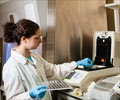Leading US supermarket chain Walgreen is putting on hold its plans to stock its shelves with genetic testing kits as the FDA wades in.

Pathway Genomics' tests purport to examine saliva samples to assess a person's risk of getting more than 70 diseases including heart disease, hypertension and lung cancer. The company also offers carrier testing for pre-pregnancy planning, which would test for mutations that cause genetic disorders such as cystic fibrosis and Tay-Sachs disease.
The $20 kits contain a plastic tube to contain saliva, instructions and a postage-paid envelope to send the spit sample to the laboratory. The testing costs about $79 to $249.
Despite such claims, geneticists say the scientific understanding is not sufficient to accurately assess risks for common diseases such as cancer, diabetes and heart disease. While data about genetic markers can be obtained, scientists don't know exactly what those mean.
"Many of these markers are not understood, even what genes they are affecting right now," said Dr. Kenneth Offit, chief of clinical genetics service at Memorial Sloan-Kettering Cancer Center in New York. "It's a very, very early stage in this level of genomic research."
FDA said that the firm's Genetic Health Report — a home-use saliva collection kit that is at the center of a deal announced earlier this week with retail pharmacy chain Walgreen's — "appears to meet the definition of a device as that term is defined" by federal legislation. The agency said that it has no record of the product being cleared for marketing.
Advertisement
FDA has asked Pathway Genomics to respond to its letter within 15 days. Walgreen said they would not be offering the Pathway product to its customers till the situation is clarified.
Meanwhile, the American Clinical Laboratory Association issued a statement urging consumers to seek guidance from a physician when using a direct-to-consumer genetic test.
Earlier this week, Pathway Genomics said the kits do not require FDA approval because they are in an exempt class.
"In our company, our bar is so high," said Michael Nova, the chief medical officer at Pathway Genomics. "We welcome any discussion with FDA, but we haven't had anybody at the FDA say anything to us."
The kits help people make better health choices, Nova said. The company has full-time genetic counselors, nutritionists and doctors if consumers or their doctor wants to discuss a genetics report, he said.
These kits are not new. Pathway Genomics has sold its kits online since September, but is the first to sell the product at a major, nationwide chain. More than 30 companies have offered personal genetic testing through online orders for years.
The FDA said it has been reviewing online marketing practices of these companies and has reached out requesting that the companies speak to the agency about the claims.
The Federal Trade Commission also warned consumers on its website that direct-to-consumer tests "lack scientific validity and others provide medical results that are meaningful only in the context of a full medical evaluation."
Most genetic tests have not been approved by the FDA, said W. Andrew Faucett, director of the genomics and public health program at the Emory University School of Medicine.
For these types of tests, "the science is very immature. I don't think anybody knows what is the right answer," he said.
A saliva sample from a person sent to several genetic testing companies may yield conflicting results.
"You can get different risks based on this test versus a similar test done by one of their competitors because they're looking at different risk markers and using different risk algorithms," Faucett said.
Many experts suggest consulting a counsellor before anyone opts for genetic testing.Advertisement
Earlier this week, Pathway Genomics said the kits do not require FDA approval because they are in an exempt class.
"In our company, our bar is so high," said Michael Nova, the chief medical officer at Pathway Genomics. "We welcome any discussion with FDA, but we haven't had anybody at the FDA say anything to us."
The kits help people make better health choices, Nova said. The company has full-time genetic counselors, nutritionists and doctors if consumers or their doctor wants to discuss a genetics report, he said.
These kits are not new. Pathway Genomics has sold its kits online since September, but is the first to sell the product at a major, nationwide chain. More than 30 companies have offered personal genetic testing through online orders for years.
The FDA said it has been reviewing online marketing practices of these companies and has reached out requesting that the companies speak to the agency about the claims.
The Federal Trade Commission also warned consumers on its website that direct-to-consumer tests "lack scientific validity and others provide medical results that are meaningful only in the context of a full medical evaluation."
Most genetic tests have not been approved by the FDA, said W. Andrew Faucett, director of the genomics and public health program at the Emory University School of Medicine.
For these types of tests, "the science is very immature. I don't think anybody knows what is the right answer," he said.
A saliva sample from a person sent to several genetic testing companies may yield conflicting results.
"You can get different risks based on this test versus a similar test done by one of their competitors because they're looking at different risk markers and using different risk algorithms," Faucett said.
Source-Medindia
GPL












